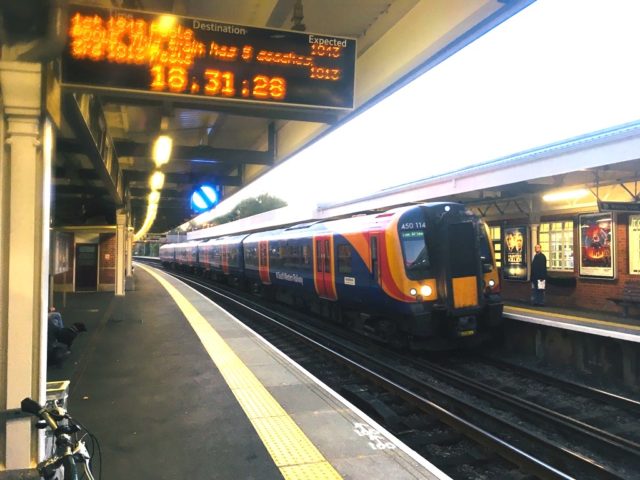Mission: To promote driving less so all may live more.
Emission: There are 6 years, 50 weeks, 6 days, 9 hours, and 43 minutes until the Climate Clock reaches zero (approximate).[1]
Free Transportation
My daughter Mindy informed me that for the month of August, the public transportation of Denver-Boulder is free. This includes buses, regional buses, airport buses, and light-rail. Yesterday when I rode the bus a sign confirmed it: “Zero Fare for Cleaner Air.”
Not limited to Denver-Boulder, free public transportation is a global trend, not only for the month of August but for the future. A wonderful article, “Free public transport: the new global initiative clearing the air, roads and helping keep climate targets on track,” concludes:
With a growing pile of evidence to support it, free public transport is going from something that old economic thinking could barely imagine, to being a practical and highly effective way rapidly to change behaviour bringing climate, health, communal and economic benefits. It’s a single initiative that is solving multiple problems.
In addition to chipping away at the air and noise pollution generated by cars, free public transportation “is a social justice policy too that helps lift people out of poverty and fosters a sense of social cohesiveness through greater equality of opportunity and accessibility.” This is one solution to auto-dependency that can help instead of penalize poorer people. Finally, the article stresses that the fear of catching covid–19 on public transportation has been greatly exaggerated (not that I wouldn’t vie for an isolated seat on any bus or train).
According to the NY Times, over 100 cities are making their public transportation free. Not just cities but some countries are making their transportation free or nearly free. In Luxembourg, it is free, showing Luxembourg to be a small yet smart country. In Germany for the summer months, a €9-a-month ticket allows travel everywhere in Germany, local and regional.
Making transportation fares free obviously doesn’t imply that the transportation is free: someone’s paying. Public transportation depends on fares, government subsidization, and third-party funding. If you take away fares, then the other two sources must compensate (or exceed) the amount that was provided by fares. Third-party funding includes advertisements inside and outside of buses, as well as renting out retail space in bus and train depots. If public transportation becomes a country’s primary mode of transportation, third-party funding can increase drastically, attracting private investors who may see a profitable return with a green conscience to boot.
What this all means? We humans have dug ourselves into a pit from which we may not escape. But there are some exit routes still available, one of them being public transportation. Making it free for a while or forever cannot hurt and may encourage some people, particularly Americans, to give it a try. I do know people for whom riding a bus is tantamount to what riding an upside-down-and-spinning amusement park ride would be for me. Some people who try public transportation may find out the benefits… far lower stress, keeping the planet alive, and reading a good book, for starters.
With few exceptions in the US, bus routing is so scarce/infrequent that buses remain impracticable. For decades, public transportation in the US has been locked in a vicious cycle: buses won’t improve until they are used by a much greater number of people, and people won’t ride buses until they are improved. Anything that breaks that cycle is a giant step forward. Admittedly, Denver’s one-month-free won’t change much. But then, remember Luxembourg!
Hot Weather
On July 19th, 2022, the temperature in London exceeded 40ºC for the first time in history. That’s 104ºF.[2] In itself, 104ºF is not entirely remarkable. Remember last year in Canada? On June 29, 2021, the temperature in Lytton, BC reached 49.6 °C
What’s remarkable about the London weather is how the weather forecasters were mistreated. According to an article on the BBC web site, “The BBC’s team received hundreds of abusive tweets or emails questioning their reports and telling them to ‘get a grip’, as temperatures hit 40C.” The majority of the abuse arose from those who disliked the unprecedented hot weather being linked to climate change, a complaint that is sounding more ludicrous as every year and every heat wave rolls by. A BBC news broadcast added that some of the abuse was simply a complaint against the hot weather, as if weather forecasters actually create the weather. Some complained that the role of climate change was under reported. Hot weather and hot heads make a bad mix.
Today’s Bollard
Bollards stop cars, sometimes brutally, offering a kind of payback moment to those who frequently feel threatened by drivers. Likely, those whose cars are stopped by bollards get citations, but probably not in this case.
This video has an optional soundtrack (in case you want to mute it—I would):
There is nothing else in the world that makes people this happy.#WorldBollardAssociation pic.twitter.com/CB4Fn1Pm9s
— World Bollard Association™ (@WorldBollard) July 4, 2022
____Footnotes____
[1] This is the estimated duration until earth’s temperature rises 1.5ºC above pre-industrial temperatures. When a country makes headway against CO emissions, the time is extended. When industry makes headway against environmentalism, the time is shortened. Somewhere between an increase of 1.5 and 2.0°C, grim things are predicted. This is purely an estimate that is frequently.
The figures in this post are taken from the Wikipedia article “Climate Clock”. Several climate clocks exist. This following one provides a more generous estimate (in case you are feeling anxious): https://climateclock.net/. This web log will present the Wikipedia estimate for the particular day for which any given post is published.
[2] Centigrade to Fahrenheit:
- Multiply by 9/5 because a Centigrade degree is that much bigger:
40*9=360, 360/5=72º - Add 32º since that’s freezing for Fahrenheit:
72+32=104º

